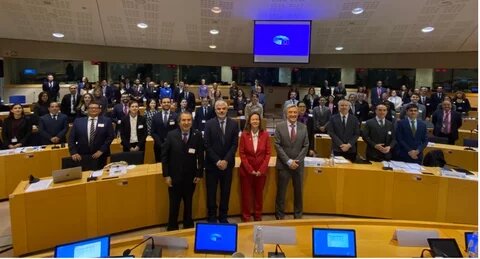On November 14, 2022, the VI and VII Ordinary Sessions of the Board of Directors of the EU-LAC International Foundation took place in the European Parliament. The main points discussed were the report on the Foundation's activities during 2022, as well as the presentation of the Annual Work Programme for 2023 and the discussions on the role of the Foundation for the bi-regional Summit by mid-2023.
In total, 42 delegations participated: Nineteen (19) from Latin America and the Caribbean: Argentina, Belize, Bolivia, Chile, Colombia, Costa Rica, Dominican Republic, Ecuador, Guatemala, Panama, Paraguay, Peru, Uruguay, Mexico, Venezuela, El Salvador, Bahamas, Cuba, Jamaica, and Dominican Republic. On behalf of the EU, twenty-four (24) delegations were present, including the EU itself: Croatia, Czech Republic, Germany, Hungary, Italy, Latvia, Lithuania, Luxembourg, Netherlands, Romania, Spain, Portugal, Belgium, France, Poland, Slovenia, Denmark, Ireland, Cyprus, Malta, Austria, Estonia, Greece, SEAE.
The Board was co-chaired by the Ambassador of Argentina to the European Union, Pablo Grinspún in his capacity as President Pro Tempore of CELAC, and on behalf of the EU by the Deputy Director for the Americas of the European External Action Service, Javier Niño Pérez. The EU-LAC International Foundation was represented by the President, Leire Pajín and the Executive Director, Adrián Bonilla.
The LAC Co-Chair opened the session by welcoming all delegations and giving the floor to the Foundation's Executive Board for introductory remarks. The context in which the Meeting took place was largely highlighted: post-pandemic recovery and face-to-face activities; the conflict in Ukraine and the resulting economic and energy crisis; the prospect of the bi-regional EU-CELAC Summit for mid-2023. The III EU-CELAC Ministerial Meeting of 27 October 2022 in Buenos Aires and the resulting roadmap, which marked a renewal of the bi-regional dialogue, based on a sustainable and positive agenda, were also taken into account.
Ratification by two Members during the year, namely Greece (February) and Argentina (October), was received with great enthusiasm. The Irish delegation indicated that it was close to completing ratification of the agreement.
Recalling the centrality of inclusiveness in the work carried out at the Foundation, delegations congratulated the Foundation and congratulated the Foundation and its staff for their work and for their role in boosting the bi-regional dialogue by linking civil society with policy makers.
As a central part of the session, the Board of Governors approved the ambitious annual work program and budget for 2023, while several delegations stressed the importance of accompanying the bi-regional Summit scheduled for next year.
